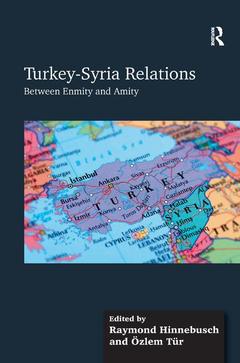Turkey-Syria Relations Between Enmity and Amity
Auteur : Tür Özlem
Coordonnateur : Hinnebusch Raymond

Date de parution : 04-2013
15.6x23.4 cm
Disponible chez l'éditeur (délai d'approvisionnement : 14 jours).
Prix indicatif 164,74 €
Ajouter au panierThème de Turkey-Syria Relations :
Mots-clés :
syrian; turkish; asad; regime; uprising; foreign; policy; high; level; strategic; High Level Strategic Cooperation Council; Turkey Syria Relations; AK Parti; Syrian Turkish Relations; Asad Regime; Syrian Muslim Brotherhood; Turkish Foreign Policy; Syrian Uprising; Syrian Arab News Agency; Turkey’s Foreign Policy; NATO Membership; GAFTA; Turkish Syrian Border; Syrian Crisis; Arab Uprising; Trans-boundary Water; EU Foreign Minister; NATO Coalition; Euphrates Tigris Region; Euphrates Tigris River System; NATO Member; EU’s Declaration; Trilateral Front; Iran’s Central Bank; Turkish EU Relation



